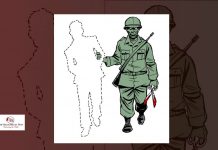Demonstrations were organized in Quetta and Hub Chowki in the memory of the Baloch leader Karima Baloch on Wednesday.
Chanting the slogan of “long live revolution”, scores of participants – predominantly students – carried placards, banners and portraits of the deceased rights activist that ubiquitously bore the messages “#StateKilledKarimaBaloch” and “Karima Baloch – the symbol of resistance”, and demanded the international community to take notice of her mysterious death and bring the culprits to justice.
The demonstrators also held a candlelight vigil for the former Chairperson of BSO-Azad who is also considered the “pioneer of women activism” in Balochistan.
According to the details, scores of people participated in a rally organized by the Baloch Yakjehti Community in Hub Chowki on Wednesday. The participants gathered in front of the Lasbela Press Club and carried out a rally on the RCD road.
Addressing the crowd, the speakers said that: “Karima is the symbol of resistance; ideologies don’t die. She will continue to lead us.”
Mahzaib Baloch, the young nephew of the missing Rashid Hussain, was also among the speakers to address the crowd in front of the Lasbela Press Club. In a surprisingly precocious tone, the young activist said that if we had not been silence on the “enforced disappearance” of Rashid Hussain or at the dead body of Sajid Hussain, this incident might not have happened. She said that our silence is becoming increasingly baneful for our nation.
Other speakers said that the ‘murder’ of Karima Baloch in Canada is raising many questions; the Canadian government is not unaccountable, it must launch a thorough investigation of the incident.
A similar demonstration was also organized in Quetta by the Baloch Yakjehti Committee, which has also announced that it will carry out protests in other areas of Balochistan as well. Baloch activists distributed pamphlets on the streets, inviting people to join the protest and raise voice for Karima Baloch. In one viral photo on social media, student leader Mahrang Baloch can be seen extending a pamphlet to a Frontier Corps sepoy on the streets of Quetta.
The speakers paid tribute to Karima Baloch for her work in human rights and said that she was a charismatic and an influential leader. She led the Baloch national politics at a critical juncture of its existence – when the students were mired in despondency, when the “kill-and-dump” policy of the state was increasingly gaining momentum and when Baloch political workers were being “forcibly disappeared” en masse and their mutilated, bruised and partially decomposed bodies were surfacing throughout Balochistan. When the whole Balochistan was terrified, Karima Baloch stood her ground and continued to revitalize the Baloch politics, the speakers said.
They further said that it was her commitment, perseverance and courage that led the Baloch student politics in an utterly new and explicit direction. She was the symbol of resistance, and we pay our heartfelt tributes to her unperishable sacrifices.
Addressing her mysterious death, the speakers said that Miss Baloch’s death is not an accident, but rather the continuation of the “kill-and-dump” policy of the Pakistani state. Karima Baloch’s death is not the only case of an assault on an exiled political worker. Before her, Sajid Hussain was ‘abducted’ and subsequently ‘martyred’ in Sweden. The speakers said that the silence of international rights groups on the plight of Baloch political workers is a reflection of their prejudice against them.
The speakers added that the land of Balochistan has been narrowed down for the Baloch in the past. Large-scale military operations, arsoning of houses and property and enforced disappearance of social and political workers have become commonplace in Balochistan. In such an environment, it has become practically impossible to carry out political activities, which is why hundreds of activists have resorted to abandoning their homeland and seeking asylum in foreign countries. The brutality of the state used to be confined within the premises of Balochistan, but now, it has overspilled into the foreign countries as well.
They concluded by saying that certain institutions hold dear the resource-rich land of the Baloch nation more than its people, and they won’t back off from genocide if that is the only option for them to acquire this land for themselves. “It is these institutions which are responsible for the murder of Banuk Karima Baloch”, they said.
It is pertinent to mention that the officials have not yet unveiled the real cause behind Miss Baloch’s death. Her family and Baloch political factions claim that she has been murdered, but the officials in the Toronto police department have termed her death as “non-criminal.”
On the other hand, the social media has bubbled up with appeals of an unbiased, thorough investigation on her death. Amnesty International, Indian actress Kangana Ranaut, writer Tarek Fateh and several other high-profile figures and organizations have demanded that the perpetrators be brought to justice.






























